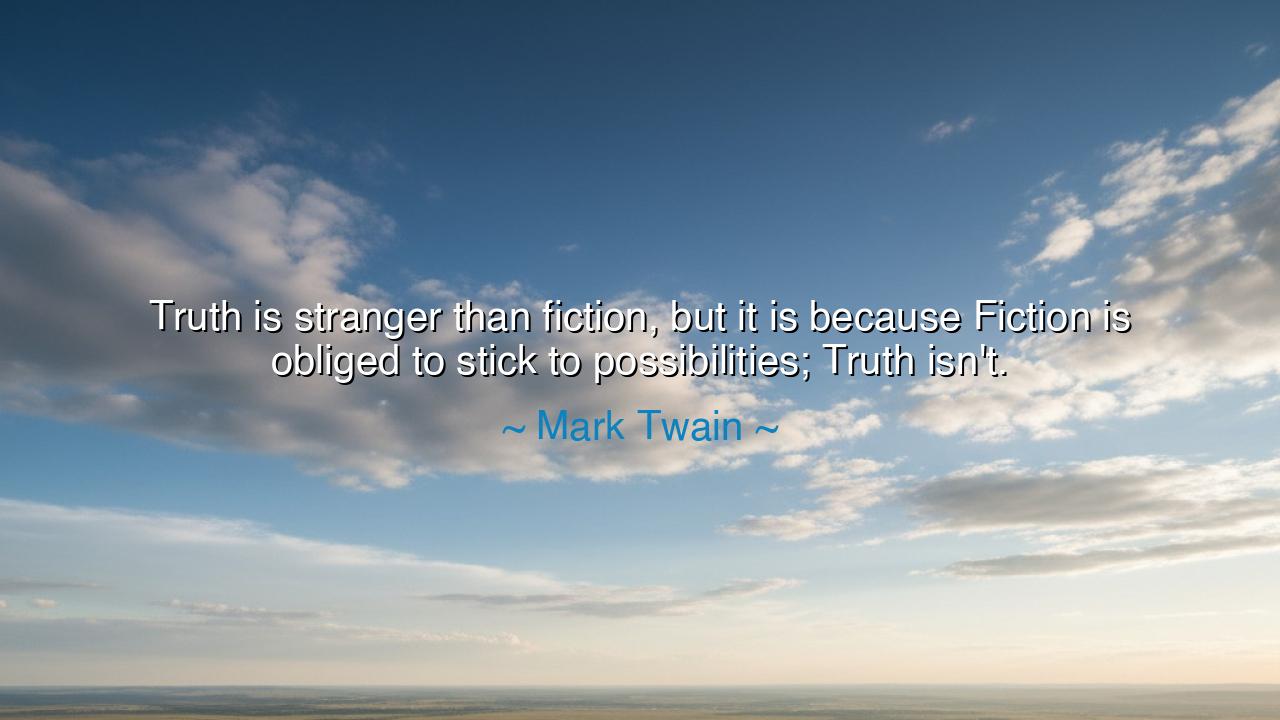
Truth is stranger than fiction, but it is because Fiction is
Truth is stranger than fiction, but it is because Fiction is obliged to stick to possibilities; Truth isn't.






"Truth is stranger than fiction, but it is because Fiction is obliged to stick to possibilities; Truth isn't." Thus declared Mark Twain, master of wit and wisdom, whose words still resound with the weight of paradox. In this teaching he reveals a truth that humbles the imagination: that fiction must obey the chains of logic, coherence, and probability, while truth—reality itself—is bound by no such laws. Fiction must make sense, or the reader will reject it; but truth may unfold in ways so improbable, so absurd, so impossible to predict, that no storyteller would dare to invent it.
The ancients themselves saw glimpses of this mystery. They told myths not only to explain the order of things, but to express the strangeness of the world that often exceeded reason. Earthquakes, plagues, sudden rises and falls of kings—these events, though real, defied the neat structure of possibility. And so men clothed them in stories of gods and monsters, because reality itself seemed too wild to accept. Twain’s words echo this ancient recognition: the universe is stranger than the tales we weave about it.
History abounds with examples. Consider the fall of the Roman Empire—not in a single cataclysm, but in a long, uneven crumbling that few foresaw. Had a novelist written of a mighty empire collapsing through decadence, corruption, and the migrations of tribes, critics might have said the tale lacked unity, that it was implausible. Yet this was the truth, and it remains one of history’s most astonishing realities. No fiction could have dared to arrange events in such improbable disorder.
Or recall the tale of Rasputin, the mystic of Russia. Poisoned, shot, beaten, and yet still alive until he was finally drowned—his story seems too bizarre for the pages of a novel. Readers would call it exaggerated, unbelievable. Yet this was history, and it proves Twain’s wisdom: truth is not bound to the realm of the possible, for it is free to unfold in ways that defy every expectation.
The lesson is both humbling and liberating. It reminds us that life will not always conform to the patterns we expect. We may desire neat beginnings, middles, and ends; we may crave logic in our destinies. But truth is wilder. It interrupts with accidents, with miracles, with absurdities. To live wisely is not to demand that life follow the rules of fiction, but to embrace its strangeness, its unpredictability, and its mystery.
Practically, this means we must be prepared for the unexpected. Do not cling too tightly to the belief that life must make sense at every turn. When something improbable or astonishing happens, do not reject it as impossible, but ask instead: "What truth lies in this strangeness?" For often, the very events we call absurd carry within them the deepest lessons, shaping us in ways no ordinary tale could.
So remember, children of tomorrow: truth is stranger than fiction, for fiction is bound by probability, but truth is boundless. Let this wisdom free you from the need to control every outcome. Let it give you courage when the world feels chaotic. For if life is stranger than the stories we tell, then it is also richer, fuller, and more wondrous. Walk, then, not with fear, but with awe, for you are living in a tale no fiction could contain.






HAHung A
Twain’s comment on truth and fiction challenges our conventional ideas about storytelling. Fiction, constrained by possibility, often feels more comfortable because it fits into patterns we expect, while truth is wild and unpredictable. But does that make truth more valuable, or just harder to accept? How do we approach situations that defy logic and reality, and how do we balance the strange elements of truth with the more structured nature of fiction?
NTMy Nguyen Thao
This quote really made me think about how fiction often feels more predictable, whereas truth can feel overwhelming and disorienting. Twain suggests that fiction has rules it must follow, but truth is chaotic and free to break those rules. Does this mean that our search for truth will always lead us into unfamiliar, sometimes uncomfortable territory, or can truth also provide us with the clarity and certainty that fiction can’t?
Ttakiminana
Twain’s idea that fiction sticks to possibilities while truth is limitless is interesting because it suggests that fiction, no matter how imaginative, is confined by our perceptions of what could happen, while truth often defies these boundaries. But can we ever fully accept truth without trying to make it fit into our understanding of the possible? Is there a point where the line between truth and fiction becomes too blurry to distinguish?
DAChu Duc Anh
I love how Twain points out that truth often surpasses fiction in its strangeness because fiction is bound by the rules of possibility. It made me think—how often do we encounter situations in life that feel too bizarre or extraordinary to be real? Is the world we live in actually more strange and unpredictable than any story we could imagine? How do we reconcile the strange aspects of life with our need for understanding and order?
LHLan Huong
Mark Twain's insight into the relationship between truth and fiction is fascinating. It highlights how fiction, while imaginative, is still limited by what is plausible, while truth knows no such constraints. But does this make truth inherently more complex and unpredictable than fiction, or does it just reflect the chaotic nature of reality? Can we truly handle the full extent of truth, or do we prefer the comforting boundaries that fiction offers?